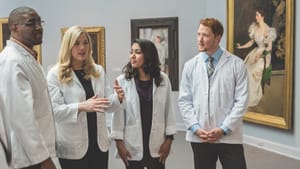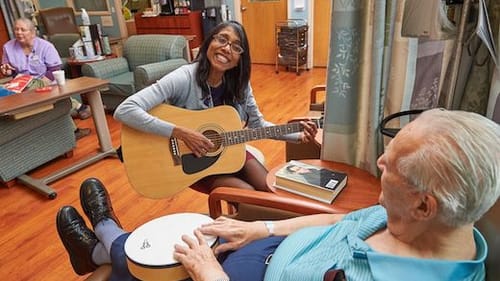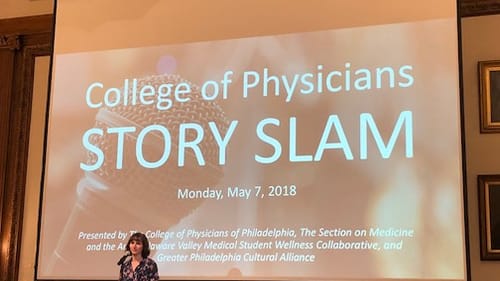Tell me how you really feel
GPCA introduces "narrative medicine" to Philly with a story slam

Just attending an event for the modern medical community hosted by Philly’s College of Physicians reminds you how much the field is changing. The country’s oldest private medical society (founded 1787) has enough portraits of dead white guys to rival the Union League.
But the students, doctors, and supporters who packed the upstairs halls of the building that also houses the Mütter Museum ranged from first-year med-schoolers to graying MDs, a racially diverse room of men and women with different abilities.
The group assembled on May 7, 2018, for Philly’s first-ever citywide medical story slam, presented in partnership with the Greater Philadelphia Cultural Alliance (GPCA).
A healthy agenda
The slam marked the release of GPCA’s Agenda: Wellness materials. These include a brochure excerpting studies on arts-based curricula and programs for medical professionals. Apparently, the arts improve doctors’ skills and patients' outcomes. (You can find the full report here.)
The event brought representatives from seven local medical schools to the same stage, for a total of 14 original, real-life five-minute stories. Temple University’s Lewis Katz School of Medicine is a leader in the emerging field of “narrative medicine,” which helps medical students develop storytelling skills.
Why teach storytelling to future doctors? So they can learn to build and maintain empathy while gaining clinical skills — and to help them fight burnout.
Naturally, some of the medical slam’s tales took in gruesome territory. Dr. Rosalind Kaplan (an internist slamming for Thomas Jefferson University’s Sidney Kimmel Medical College), told the story “Love in the Time of Hematemesis.” She cast a fatally exsanguinating (translation: bleeding to death) patient as a sort-of-comedic backdrop for the story of her engagement to her husband of 30 years.
Brooke Saffren (from the Philadelphia College of Osteopathic Medicine’s class of 2020) shared the experience of losing her dad to cholangiocarcinoma (bile duct cancer) just before she entered med school. His oncologists — some caring, some cruel — inspired her own patient-care goals.
The winners
The night’s winning storyteller, Miranda Haslam (Temple, class of 2021), cast the hospital “purgatory” of a trauma bed as a relentlessly repeating “dance” around shattered bodies. The audience tiptoed with her over pools of fresh blood to observe a young man’s chest wrenched open by emergency doctors after a bullet ripped through an atrium of his heart. Experienced staffers suggested Haslam practice suturing once they had pronounced him dead.

Second-place winner Vidya Viswanathan (Perelman School of Medicine at the University of Pennsylvania, class of 2019) also touched a nerve. A minor — but severely admonished — mishap during an abdominal surgery led to so much stress and exhaustion that she fainted right next to the patient, still clutching a liver clamp. She reflected on how psychological safety — that is, an environment that doesn’t emotionally terrorize people for their mistakes — would result in better education for future physicians.
Third-place storyteller Lauren Waldren (also of Temple, class of 2018), shared her experiences after a childhood stroke. She hopes her disability will be an advantage in her career as a pediatric neurologist, where she’ll deliver diagnoses to families in ways that do not proscribe children’s potential.
“Problem patients”
But many stories echoed the underlying theme of Haslam’s story: a cyclical world of life and death, without clear answers. Rowan University School of Osteopathic Medicine student Keith Semler (class of 2018) offered an eloquent window on how the physical contact of pronouncing someone dead gave him “renewed respect for the complexity and beauty of life.”
Other stories questioned notions of patient “compliance” as defined by doctors, including a powerful tale about a “problem patient” from Kali Staman (Cooper Medical School of Rowan University, class of 2020).

Working with a Camden program to provide medical care to homeless people, Staman got a woman who hadn’t seen a doctor in 25 years to finally come into the office. Then she watched the woman disappear again after that doctor made false assumptions about her age and drug use.
Art: Doctors’ orders?
One study in GPCA’s Agenda: Wellness summary found that med students who took a course in fine-art observation at the Philadelphia Museum of Art showed a 26 percent increase in diagnostic and observation abilities.
There’s also evidence that art-based med-school electives, as well as patient recovery programs that incorporate the arts, may reduce medical residents’ depression and patients’ reliance on painkilling drugs.
It’s tempting to say that narrative medicine and the arts are new ways to make sense of a complex scientific field. But if this story slam proved anything, it’s that a physician’s world has no easy answers or certain resolutions.
Present and future doctors repeatedly focused their narrative skills on the cracks, systemic flaws, and unexpected tragedies of their profession. Somehow, the arts make medical answers more apparent — while also spotlighting how they inevitably slip away.
If narrative medicine can humanize doctors and patients along the way, though, that’s a change I’m happy to see.
What, When, Where
The College of Physicians of Philadelphia and the Greater Philadelphia Cultural Alliance presented a citywide medical story slam on May 7, 2018, at the College of Physicians, 19 S. 22nd Street, Philadelphia. (215) 557-7811 or www.philaculture.org.
Sign up for our newsletter
All of the week's new articles, all in one place. Sign up for the free weekly BSR newsletters, and don't miss a conversation.

 Alaina Johns
Alaina Johns